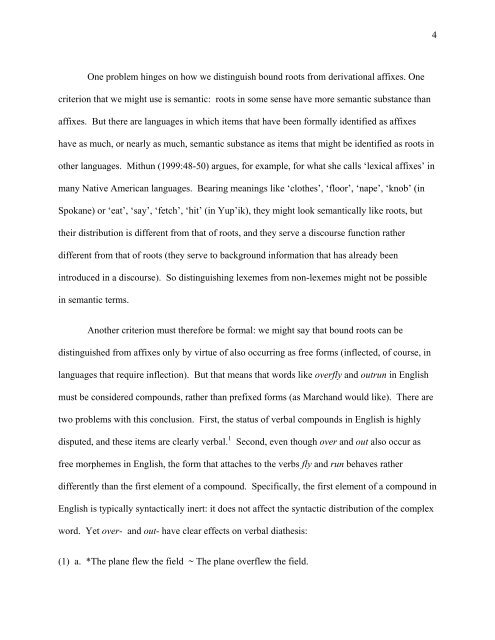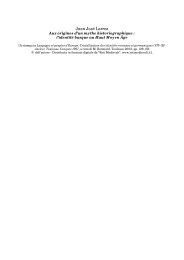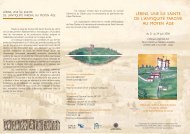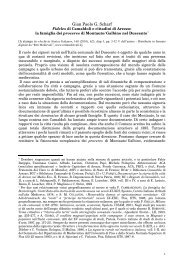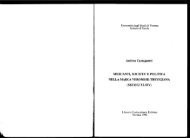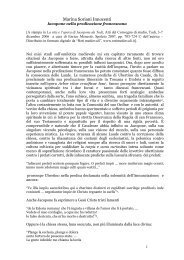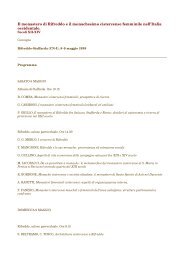- Page 1 and 2: Chapter 1. Introduction: status and
- Page 3: always make a clean distinction bet
- Page 7 and 8: Spelling also cannot be taken as a
- Page 9 and 10: Nevertheless, theorists have repeat
- Page 11 and 12: Sampson (1980: 265-266) suggests th
- Page 13 and 14: volume]); vowel deletion (Hebrew [B
- Page 15 and 16: evidence that a sequence of two roo
- Page 17 and 18: 1.1.4 Summary The picture that emer
- Page 19 and 20: Several of these theories fit rough
- Page 21 and 22: Chapter 16 takes a diachronic view
- Page 23 and 24: of grammar‘? The study of compoun
- Page 25 and 26: (kinsman, deersman) do not even hav
- Page 27 and 28: peculiarities: Chapter 1 offers det
- Page 29 and 30: 2.2.2.1 Lexical and grammatical var
- Page 31 and 32: way, denotes. And finally, we come
- Page 33 and 34: modern, rather fashionable term) is
- Page 35 and 36: unit) of its own right and it enter
- Page 37 and 38: edbreast, highbrow, common sense, e
- Page 39 and 40: deep+water, by+way, etc. Here the p
- Page 41 and 42: side on conventionality, the criter
- Page 43 and 44: they could very well be regarded as
- Page 45 and 46: 5 It is precisely this gradient cha
- Page 47: 13 For instance, the English countr
- Page 50 and 51: 3.2 Problems in the classification
- Page 52 and 53: As for the ―synthetic compound‖
- Page 54 and 55:
The properties of these formations
- Page 56 and 57:
c) Marchand (1969) (only endocentri
- Page 58 and 59:
h) Bauer (2001b) 13 determinative/e
- Page 60 and 61:
given that the notion of exocentric
- Page 62 and 63:
different criteria (i.e. the relati
- Page 64 and 65:
overtly expressed (see apron string
- Page 66 and 67:
The compounds of these three classe
- Page 68 and 69:
6) neoclassical compounds sW+sW sW+
- Page 70 and 71:
) N+N subordinate compounds skeleto
- Page 72 and 73:
3.4 A new proposal In line with Kuh
- Page 74 and 75:
and the interpretation of the compo
- Page 76 and 77:
Wurtenberg) or redundant as is the
- Page 78 and 79:
that the classification can probabl
- Page 80 and 81:
should be noted though that Bally
- Page 82 and 83:
23 Please note that in our database
- Page 84 and 85:
(section 4.1.2), and finally descri
- Page 86 and 87:
In Lees‟s analysis, the deep stru
- Page 88 and 89:
presenting and evaluating the theor
- Page 90 and 91:
The issue of the power of the rules
- Page 92 and 93:
As opposed to the introduction of r
- Page 94 and 95:
c. he does not motivate the individ
- Page 96 and 97:
4.2. Development of transformationa
- Page 98 and 99:
the predicate to be deleted in the
- Page 100 and 101:
expressions, e.g. soap opera, and p
- Page 102 and 103:
One of the properties of Levi‟s a
- Page 104 and 105:
Apart from Marchand, two other infl
- Page 106 and 107:
(14) a. Holzhaus („timber house
- Page 108 and 109:
4.3.1. Compounds in the lexicon Two
- Page 110 and 111:
and much of the information of thes
- Page 112 and 113:
nouns. Thus, the relationships in (
- Page 114 and 115:
(affixes and neoclassical stems in
- Page 116 and 117:
edbug). There are two distinctions
- Page 118 and 119:
4.4.3. The legacy Although any cut-
- Page 120 and 121:
Chapter 5. A Lexical Semantic Appro
- Page 122 and 123:
of meaning than Jackendoff‘s and,
- Page 124 and 125:
they are processual in nature. (3)
- Page 126 and 127:
The affix -er has no special requir
- Page 128 and 129:
likely candidates, by looking at fe
- Page 130 and 131:
For the sake of argument, let‘s a
- Page 132 and 133:
will therefore leave open the quest
- Page 134 and 135:
(12) Classification of compounds (B
- Page 136 and 137:
c. Coordinate endocentric: producer
- Page 138 and 139:
(16) blue-green blue green [-dynami
- Page 140 and 141:
(18) mother-child (relation, party)
- Page 142 and 143:
implausible. The compounds in (19c)
- Page 144 and 145:
(22) cookbook author cookbook autho
- Page 146 and 147:
highest argument of pick must be in
- Page 148 and 149:
Generally analyses of compounding i
- Page 150 and 151:
interpretation that arises in the a
- Page 152 and 153:
course, a novel claim - the recent
- Page 154 and 155:
arguments can be characterized in t
- Page 156 and 157:
(33) a. odori-tukare ‗dance-get t
- Page 158 and 159:
5.7. Conclusion and prospectus Maki
- Page 160 and 161:
6 Bisetto and Scalise (2005, this v
- Page 162 and 163:
Chapter 6. Compounding in the Paral
- Page 164 and 165:
Figure 6.1 offers a model in terms
- Page 166 and 167:
(2) [VP V (NP) (PP)] Thus we arrive
- Page 168 and 169:
c. Paired arguments: [Port-cornstar
- Page 170 and 171:
1970 and Ryder 1994 asked subjects
- Page 172 and 173:
. [[child camel] [jockey slavery]]
- Page 174 and 175:
egarded as mappings directly betwee
- Page 176 and 177:
than a full modern language, (b) co
- Page 178 and 179:
So sometimes lexicalized meaning ha
- Page 180 and 181:
elevator shaft = ‗shaft that an e
- Page 182 and 183:
standard way to notate this is thro
- Page 184 and 185:
players in the orchestra switched i
- Page 186 and 187:
Action modality will be formalized
- Page 188 and 189:
that F is filled out by copying REA
- Page 190 and 191:
cocomposition; section 6.7 deals wi
- Page 192 and 193:
A special case of LOC (X1, Y2). CAU
- Page 194 and 195:
. N2 is a vehicle (cattle car, baby
- Page 196 and 197:
(28) barber1 shop2 = SHOP2 α ;[PF
- Page 198 and 199:
(32) a. bird1brain2 = PERSON α ; [
- Page 200 and 201:
in (20) in order to account for the
- Page 202 and 203:
7. Millikan develops the notion of
- Page 204 and 205:
Chapter 7. Compounding in Distribut
- Page 206 and 207:
point splits into two sub-derivatio
- Page 208 and 209:
instances of Vocabulary Item compet
- Page 210 and 211:
7.3. Compounding as syntax As noted
- Page 212 and 213:
(5) a. nP n° √P √STUDi n° √
- Page 214 and 215:
(7) nP n° √P √i n° √DRIVEi
- Page 216 and 217:
where, in the corresponding verb ph
- Page 218 and 219:
only be inserted in the context of
- Page 220 and 221:
Having sketched a general incorpora
- Page 222 and 223:
truck-drive will be ruled out becau
- Page 224 and 225:
I will follow Sato 2007 in treating
- Page 226 and 227:
way as their corresponding verb can
- Page 228 and 229:
8 The feature which drives movement
- Page 230 and 231:
c. pijen-o-erx(ome) (MG) f. bou-dat
- Page 232 and 233:
(2) a. F (En) b. F (Fr) root compou
- Page 234 and 235:
how they satisfy the Interface Inte
- Page 236 and 237:
. *human primate non, *primate huma
- Page 238 and 239:
oot in the basic asymmetry of morph
- Page 240 and 241:
The only option available is that t
- Page 242 and 243:
Thus, the motivation for the medial
- Page 244 and 245:
Assuming as in Chomsky (1995-2007)
- Page 246 and 247:
of the verb, and the indirect objec
- Page 248 and 249:
(33) SAMPLE OF ENGLISH OPERATOR-AFF
- Page 250 and 251:
when the root does not have I-Asp f
- Page 252 and 253:
a part of natural languages. Quanti
- Page 254 and 255:
8.2 Deriving compounds with Asymmet
- Page 256 and 257:
ecursive systems, Move, (54), imple
- Page 258 and 259:
In the Derivation-by-phase model, a
- Page 260 and 261:
interfaces first, independently fro
- Page 262 and 263:
derivations of compounds instantiat
- Page 264 and 265:
specifier of the F-tree) has SM-fea
- Page 266 and 267:
At Step 6, M-Link applies again, gi
- Page 268 and 269:
Given the features matrices in (58a
- Page 270 and 271:
shifting. M-Link applies in (83) an
- Page 272 and 273:
have an F-XP structure, and they ar
- Page 274 and 275:
according to which compounds are fo
- Page 276 and 277:
equire more generative power than a
- Page 278 and 279:
5 Compounds are asymmetrical in ter
- Page 280 and 281:
12 Compounds have been argued to be
- Page 282 and 283:
(Chomsky 2001, Legate 2003, Adger 2
- Page 284 and 285:
Chapter 9. Compounding and Lexicali
- Page 286 and 287:
as those in (1c) do not inherit the
- Page 288 and 289:
and Mohanan (1985), Kiparsky (1985)
- Page 290 and 291:
stratum-1 wept, fifth block the for
- Page 292 and 293:
whereby syntactic processes can man
- Page 294 and 295:
The distinction between phrase and
- Page 296 and 297:
compositional semantics typically a
- Page 298 and 299:
Prototypical adjectives such as tho
- Page 300 and 301:
(4) toy factory woman doctor metal
- Page 302 and 303:
constitute within the category Adje
- Page 304 and 305:
I noted above that associative adje
- Page 306 and 307:
(9) beautiful dancer heavy smoker b
- Page 308 and 309:
only. Moreover, associative adjecti
- Page 310 and 311:
Secondly, recall the examples first
- Page 312 and 313:
(11) a. Is this a feline disease or
- Page 314 and 315:
corn oil (compare olive oil, end-st
- Page 316 and 317:
It has been shown, however, that th
- Page 318 and 319:
As we would expect of lexical const
- Page 320 and 321:
That a productive, stratum-2 phenom
- Page 322 and 323:
Chapter 10. Compounding and constru
- Page 324 and 325:
and it will be shown how they can b
- Page 326 and 327:
(3)‘ [[a]X [b]Yi ]Y ‗Yi with re
- Page 328 and 329:
compounding (and under certain cond
- Page 330 and 331:
In the hierarchical lexicon approac
- Page 332 and 333:
Therefore, the language user may as
- Page 334 and 335:
The heads of the complex words have
- Page 336 and 337:
10.3. Headedness issues Since Willi
- Page 338 and 339:
―Constructed words arise from a g
- Page 340 and 341:
(iii) separable complex verbs such
- Page 342 and 343:
vlaggen-mak-erij ‗flag makery‘
- Page 344 and 345:
schemas for the specification of th
- Page 346 and 347:
marked (with the genitive ending -s
- Page 348 and 349:
Chapter 11. Compounding from an ono
- Page 350 and 351:
to the respective model will be giv
- Page 352 and 353:
soudce ‗judge‘, < soud- ‗judg
- Page 354 and 355:
(2) the pre-semantic level of conce
- Page 356 and 357:
11.2.3.1 The overall model Štekaue
- Page 358 and 359:
first step consists in the formatio
- Page 360 and 361:
(4) Type ―integral metonymies and
- Page 362 and 363:
11.2.6 Joachim Grzega In Grzega (20
- Page 364 and 365:
The process is completed with the a
- Page 366 and 367:
the model incorporates a type calle
- Page 368 and 369:
junction of morphemes from other ty
- Page 370 and 371:
Dokulil, Horecký, Blank and Koch.
- Page 372 and 373:
category of, for example, privative
- Page 374 and 375:
Chapter 12. Compounding in Cognitiv
- Page 376 and 377:
whereby the semantic unit [OPENER]
- Page 378 and 379:
Langacker (1999: 144) remarks, "eve
- Page 380 and 381:
on properties that are too marginal
- Page 382 and 383:
conceptualized as associated", such
- Page 384 and 385:
In clear cases, Tuggy (2007: 152) s
- Page 386 and 387:
grasp the meaning of a construction
- Page 388 and 389:
their expression in the language it
- Page 390 and 391:
Plag (2003: 132) starts his chapter
- Page 392 and 393:
Booij 1992 for a semantic interpret
- Page 394 and 395:
of compounding, she argues, are bas
- Page 396 and 397:
listing results for compounds like
- Page 398 and 399:
example which Ryder gives here is t
- Page 400 and 401:
'blending', it also includes aspect
- Page 402 and 403:
In a number of recent cognitive pub
- Page 404 and 405:
as composite expressions, the use o
- Page 406 and 407:
agnates have often been restricted
- Page 408 and 409:
13.2. Theoretical Issues and Approa
- Page 410 and 411:
Pollatsek, Hyönä, & Bertram 2000,
- Page 412 and 413:
and Baayen model, this model assume
- Page 414 and 415:
Not all researchers agree that morp
- Page 416 and 417:
constituents were correlated with r
- Page 418 and 419:
Freeman (1979), that the morphologi
- Page 420 and 421:
speeded responses to orgel. Likewis
- Page 422 and 423:
was related to the meaning of the w
- Page 424 and 425:
availability of a word‘s lexical
- Page 426 and 427:
opaque compounds, like transparent
- Page 428 and 429:
meaning. That is, the meaning of ev
- Page 430 and 431:
13.5. Final Thoughts Psycholinguist
- Page 432 and 433:
14.2. Related theories 14.2.1 Dokul
- Page 434 and 435:
‗townsman‘, cizinec ‗foreigne
- Page 436 and 437:
modifier, not by the head: 4 the se
- Page 438 and 439:
Zimmer (1971, 1972) should be credi
- Page 440 and 441:
- the concept of word-formation as
- Page 442 and 443:
elongs. Onomasiological Types are c
- Page 444 and 445:
verbal head functions as an onomasi
- Page 446 and 447:
epresented by the base does or what
- Page 448 and 449:
In our example, a prototypical feat
- Page 450 and 451:
the onomasiological structure will
- Page 452 and 453:
glass. They related their observati
- Page 454 and 455:
h. If the structure contains the In
- Page 456 and 457:
In any case, the role of the relati
- Page 458 and 459:
14.3.7 Objectified Predictability R
- Page 460 and 461:
From this it follows that a high ab
- Page 462 and 463:
used for doing something to balls
- Page 464 and 465:
In fact, every predictable meaning
- Page 466 and 467:
12. Knowledge of the meaning(s) of
- Page 468 and 469:
The transpositional type of onomasi
- Page 470 and 471:
20 Cf, for example, van Lint (1982)
- Page 472 and 473:
language. 2 These may be extended b
- Page 474 and 475:
internally to the modifier noun in
- Page 476 and 477:
uttons‘, or a tool that we use in
- Page 478 and 479:
were asked to describe picture card
- Page 480 and 481:
Schoolchildren and adults made rath
- Page 482 and 483:
favored by children as well. To thi
- Page 484 and 485:
nominal constructions in their lang
- Page 486 and 487:
different relations had no effect o
- Page 488 and 489:
In order to comprehend and produce
- Page 490 and 491:
Another facet of acquisition of com
- Page 492 and 493:
15.3.4 A long developmental route:
- Page 494 and 495:
phrasal context -- e.g., *tmunat sh
- Page 496 and 497:
compounds in their oral narratives
- Page 498 and 499:
15.4. Discussion Analysis of a rang
- Page 500 and 501:
of passives in different languages
- Page 502 and 503:
constructed out of consonantal root
- Page 504 and 505:
(as in Vogel and Raimy‘s study) b
- Page 506 and 507:
Endnotes I am grateful to Wolfgang
- Page 508 and 509:
indicated as +Gen, for ‗genitive
- Page 510 and 511:
18 The language-particular arbitrar
- Page 512 and 513:
ecome "words", i.e. units to be use
- Page 514 and 515:
some kind of affixation, which woul
- Page 516 and 517:
1978; Lieber 1983), whose second pa
- Page 518 and 519:
cf. the history of burger (Marchand
- Page 520 and 521:
ending, usually the genitive, but o
- Page 522 and 523:
characterized by stress/ablaut and
- Page 524 and 525:
6. Imperative compounds, e.g. Mene-
- Page 526 and 527:
structure modifier + head. This may
- Page 528 and 529:
nominative relative pronoun of the
- Page 530 and 531:
of such constructions in the German
- Page 532 and 533:
In this connection, another IE comp
- Page 534 and 535:
formations are younger than the nom
- Page 536 and 537:
9 Jacobi (1898:111) argues "dass in
- Page 538 and 539:
ung / -ing-action nouns and the par
- Page 540 and 541:
Chapter 17. Typology of Compounds L
- Page 542 and 543:
Ainu also has incorporation, often
- Page 544 and 545:
‘way of speaking’, and ike ‘a
- Page 546 and 547:
Where verbs are concerned, these ma
- Page 548 and 549:
Handschuh derives from the gender o
- Page 550 and 551:
Some of the languages that display
- Page 552 and 553:
construction. But the word as a who
- Page 554 and 555:
does not permit such a wide range o
- Page 556 and 557:
appears to be exocentric, and in En
- Page 558 and 559:
may be a form of incorporation. Aga
- Page 560 and 561:
Endnotes hyponymic drink‘ nourish
- Page 562 and 563:
organize English compounding data r
- Page 564 and 565:
oot or primary compounds fall into
- Page 566 and 567:
or adjectives in question are seman
- Page 568 and 569:
Compounds in which the second const
- Page 570 and 571:
of this type to around the time of
- Page 572 and 573:
eard) is not taken for granted, bot
- Page 574 and 575:
what is denoted by the second const
- Page 576 and 577:
although they show the characterist
- Page 578 and 579:
Figure 18.2. N N N V truck drive er
- Page 580 and 581:
stick taster). And most recently, R
- Page 582 and 583:
2 Note that when I classify a compo
- Page 584 and 585:
Second, (nominal) compounding is re
- Page 586 and 587:
Lieber 1992a) and the theoretical i
- Page 588 and 589:
computer spel computerspel ‗compu
- Page 590 and 591:
wild man wíldeman ‗wild man‘ S
- Page 592 and 593:
koop ziek koopziek ‗buy ill‘ le
- Page 594 and 595:
(21) a subordinate clause (no separ
- Page 596 and 597:
in the separable cases, the prefix
- Page 598 and 599:
compound gets the main stress of th
- Page 600 and 601:
In the literature a much-debated is
- Page 602 and 603:
19.3. Synthetic Compounds Synthetic
- Page 604 and 605:
compounds or with phrases. Verb Rai
- Page 606 and 607:
Booij & Van Santen (1998: 165) prov
- Page 608 and 609:
(47) a stenen-gooi-er ‗rock-trowe
- Page 610 and 611:
Chapter 20: IE, Germanic: German Ma
- Page 612 and 613:
quite frequent while the productivi
- Page 614 and 615:
sense or something else (sometimes
- Page 616 and 617:
perspective are: What is the distri
- Page 618 and 619:
marker of the respective lexeme. Th
- Page 620 and 621:
(11) a e Tag+Buch Tagebuch ‗diary
- Page 622 and 623:
(13) In a compound, the second cons
- Page 624 and 625:
(16) a woman that sells fish b woma
- Page 626 and 627:
structure, and they lack linking el
- Page 628 and 629:
Moreover, the noun Hemmer is in the
- Page 630 and 631:
(21) a Kur+Urlaub Kurlaub ‗cure+h
- Page 632 and 633:
2 Donalies (2004) regards self-comp
- Page 634 and 635:
(2) (3) Som regel elsker folk deres
- Page 636 and 637:
(5) ‘the big cars’ Huset er sto
- Page 638 and 639:
21.2 Introduction to Compounding Wh
- Page 640 and 641:
article, as in det store hus (see (
- Page 642 and 643:
exhaustive list of semantic relatio
- Page 644 and 645:
‘shortage of time’ and kartotek
- Page 646 and 647:
Adjective + noun compounds generall
- Page 648 and 649:
ulle·stol roll·chair wheelchair I
- Page 650 and 651:
To illustrate the productivity of c
- Page 652 and 653:
køre·teknisk (EB 3) drive·techni
- Page 654 and 655:
[vi] har ret til at … i·land·s
- Page 656 and 657:
soon something not suits her ‗She
- Page 658 and 659:
outline of the way in which compoun
- Page 660 and 661:
If they are, it means that the expr
- Page 662 and 663:
guerre froide „cold war‟ lit.
- Page 664 and 665:
X \ Y N A V ADV N N A N prêtre-ouv
- Page 666 and 667:
The NA and AN cases have already be
- Page 668 and 669:
22.3. French VN compounds The issue
- Page 670 and 671:
22.3.2. The nature of the first con
- Page 672 and 673:
conclude that Darmesteter‘s accou
- Page 674 and 675:
Denotatum Example Glosses Agent por
- Page 676 and 677:
Locative I traîne-buisson ‗bird
- Page 678 and 679:
from the 2 nd conjugational group,
- Page 680 and 681:
„N1N2 is a N1 that is also a N2 a
- Page 682 and 683:
The property in question may concer
- Page 684 and 685:
(33) *Un responsable surgelés est
- Page 686 and 687:
la filière bois se développe ?le
- Page 688 and 689:
Abbreviations The Leipzig Glossing
- Page 690 and 691:
Chapter 23. IE, Romance: Spanish La
- Page 692 and 693:
compounds), perhaps with the sole e
- Page 694 and 695:
ightly been noted that, although th
- Page 696 and 697:
(2) a. Carlos es un [Xº sinvergüe
- Page 698 and 699:
(3) a. cantante autor A+A singer au
- Page 700 and 701:
N+A / A+N These compounds are usual
- Page 702 and 703:
23.3. Discussion In the previous se
- Page 704 and 705:
The justification of why compounds
- Page 706 and 707:
characteristic of syntactic words.
- Page 708 and 709:
exists a clear-cut separation betwe
- Page 710 and 711:
the examples (cf., for instance, Br
- Page 712 and 713:
specific ad hoc properties. And, ad
- Page 714 and 715:
1 The notion of head employed here
- Page 716 and 717:
13 This analysis can also be applie
- Page 718 and 719:
. kakotixos < kak- tix- -os unlucky
- Page 720 and 721:
number of parameters, which refer t
- Page 722 and 723:
item. Thus, when it is combined wit
- Page 724 and 725:
sweet (and) bitter sweet bitter Not
- Page 726 and 727:
suffix has the form of -i- (-s is t
- Page 728 and 729:
24.7. Borderline cases In Greek, as
- Page 730 and 731:
Endnotes 1 Greek examples are given
- Page 732 and 733:
14 I choose not to include appositi
- Page 734 and 735:
their classification and interpreta
- Page 736 and 737:
compounding. 2 That is to say, ther
- Page 738 and 739:
adaptations evidently modelled on t
- Page 740 and 741:
Thus, the compound status of wodog
- Page 742 and 743:
(6) Stem 1 Stem 2 Example N N ocz-o
- Page 744 and 745:
According to traditional accounts,
- Page 746 and 747:
When analysed from the functional p
- Page 748 and 749:
The examples presented so far give
- Page 750 and 751:
-ł- trw-a-ć ‗last‘ trwa-ł-y
- Page 752 and 753:
Another look at instances of compou
- Page 754 and 755:
ciemnoczerwony ‗dark red‘, jasn
- Page 756 and 757:
5 When looked at from another angle
- Page 758 and 759:
Chapter 26. Sino-Tibetan: Mandarin
- Page 760 and 761:
natural languages. In particular, f
- Page 762 and 763:
26.2.2 Attributive compounds Attrib
- Page 764 and 765:
As far as Chinese compounding is co
- Page 766 and 767:
On the basis of Ceccagno and Bascia
- Page 768 and 769:
Table 26.4 shows examples of two-he
- Page 770 and 771:
[卫星] N [电视] N wèixīng di
- Page 772 and 773:
al., in press). Second, our general
- Page 774 and 775:
Tables: Table 26.1 - Subordinate ri
- Page 776 and 777:
Table 26.5 - Exocentric compounds C
- Page 778 and 779:
高矮 gāoăi CRD [A+A] N n high +
- Page 780 and 781:
pāngāo ‗climb + high = climb up
- Page 782 and 783:
Chapter 27. Afro-Asiatic, Semitic:
- Page 784 and 785:
properties with compounds. Finally,
- Page 786 and 787:
. *beyt xadaš xolim house new pati
- Page 788 and 789:
14. a. hu bana li shney batey ‗ec
- Page 790 and 791:
Not so in compounds, where the non-
- Page 792 and 793:
to be contrasted with the construct
- Page 794 and 795:
d. *kir me‘a/harbe levenim; *beyt
- Page 796 and 797:
When applied to constructs with a (
- Page 798 and 799:
'the same [(*senior) teacher's hous
- Page 800 and 801:
36. a. *beyt xolim xroniyim; *ha-be
- Page 802 and 803:
42. Compounds M-constructs R-constr
- Page 804 and 805:
violations of the Coordinate Struct
- Page 806 and 807:
e that they are not a morphological
- Page 808 and 809:
Reformulate the original question,
- Page 810 and 811:
least for Hebrew compounds, then, t
- Page 812 and 813:
11 The existence of P+N constructs
- Page 814 and 815:
Chapter 28 Isolate: Japanese Taro K
- Page 816 and 817:
d. Compound VNs: N-VN isi-kettei li
- Page 818 and 819:
Headless or exocentric compounds. E
- Page 820 and 821:
The nature of the exocentric compou
- Page 822 and 823:
. Kono eiga-wa [Spielberg | seisaku
- Page 824 and 825:
From this vantage point, W + -level
- Page 826 and 827:
work in the morphological plane, wh
- Page 828 and 829:
appears that only a highly limited
- Page 830 and 831:
VN incorporation. In the light verb
- Page 832 and 833:
compound can bear the honorific pre
- Page 834 and 835:
If noun doubling and modifier stran
- Page 836 and 837:
Table 28.1: Functions of compounded
- Page 838 and 839:
Table 28.3: Lexical vs. syntactic V
- Page 840 and 841:
Chapter 29. Uralic, Finno-Ugric: Hu
- Page 842 and 843:
(1) shows the productive compoundin
- Page 844 and 845:
Consequently, it seems to be more a
- Page 846 and 847:
(6) Level#et ír ‗letter-acc writ
- Page 848 and 849:
(10) a. The nonhead of a deverbal c
- Page 850 and 851:
kutya+ugatás ‗barking of a dog/d
- Page 852 and 853:
. kormány+átalakítás ‗reconst
- Page 854 and 855:
(20) regény+író ‗novel-writer
- Page 856 and 857:
(25) a. *a felrobbantó the blower
- Page 858 and 859:
(31) a. fel+megy vagy fel+mászik
- Page 860 and 861:
29.7. Exocentric compounds Bahuvrih
- Page 862 and 863:
Endnotes 1 The present paper is par
- Page 864 and 865:
Chapter 30. Athapaskan: Slave * Ker
- Page 866 and 867:
First are compounds where the form
- Page 868 and 869:
c. tɛh tl‘uh ‗ice line‘ (all
- Page 870 and 871:
. bɛh k‘ái ‗seagull‘ (Hare,
- Page 872 and 873:
(8) a. dlo b r ‗cheese‘ (Hare)
- Page 874 and 875:
(10) [Noun-Noun]N compounds a. dlo
- Page 876 and 877:
c. n yíi ‗mine‘ (Sahtú) n ‗
- Page 878 and 879:
Postposition-Noun compounds also oc
- Page 880 and 881:
d. [‘ihb go] ke ‗running shoes,
- Page 882 and 883:
30.3. Classes of Noun-Noun compound
- Page 884 and 885:
f. lálɛníh ‘e ‗sweater‘ (H
- Page 886 and 887:
[th]ɛ ‗belt‘ -[dh] ‗belt, po
- Page 888 and 889:
This suffix has two forms - one, -
- Page 890 and 891:
j ‘ɛnáke ‘é ‗parka‘ (Sah
- Page 892 and 893:
(31) a. mí kwe ‗sinker for net
- Page 894 and 895:
(34) a. shi ‗song‘ gah yín ‗
- Page 896 and 897:
Important to this discussion is the
- Page 898 and 899:
h. libó ghínɛ ‗bowl‘ (all) l
- Page 900 and 901:
Recall that in the possessive const
- Page 902 and 903:
c. [s]óts‘ɛd ya ‗necklace‘
- Page 904 and 905:
(47) a. tli ‗dog‘ (Sahtú, Sout
- Page 906 and 907:
* Many thanks to the editors and to
- Page 908 and 909:
Chapter 31. Iroquoian: Mohawk Maria
- Page 910 and 911:
(1) Basic nouns a. oká:ra‘ b. ok
- Page 912 and 913:
. akohsá:tens ohsò:kwa‘ horse n
- Page 914 and 915:
(7) Morphological verbs in use: Rit
- Page 916 and 917:
have‘ above. 3 (The verb root -ie
- Page 918 and 919:
correspondence with multi-word sent
- Page 920 and 921:
iohsté:ris wakká:raien‘. io-hst
- Page 922 and 923:
Mohawk has no lexical adjective cat
- Page 924 and 925:
It has sometimes been proposed that
- Page 926 and 927:
object) and -ia‟t-isak ‗seek (a
- Page 928 and 929:
pronominal agents rather than patie
- Page 930 and 931:
(27) Location noun: Kaia‘titáhkh
- Page 932 and 933:
intransitively for singing. It can
- Page 934 and 935:
Noun incorporation constructions ar
- Page 936 and 937:
enhaia‘taniión:ten‘ ne:‘ ...
- Page 938 and 939:
Tho ki‘ iehréta‘s tho ki‘ ie
- Page 940 and 941:
(37) Further incorporated fruit: Ka
- Page 942 and 943:
(39) Referent introduction: Kaia‘
- Page 944 and 945:
Endnotes 1 Glosses are abbreviated
- Page 946 and 947:
Chapter 32. Arawakan: Maipure-Yavit
- Page 948 and 949:
Branches Languages († extinct) 1.
- Page 950 and 951:
‗the ghost of the late Makapu‘
- Page 952 and 953:
(6) anítu ‗wife‘ -áni ‗son
- Page 954 and 955:
A genitive compound analogous to th
- Page 956 and 957:
pausal form of (14b), for example,
- Page 958 and 959:
(20) a wâù§ r i têwa- i b. apì
- Page 960 and 961:
32.5. An apparent case of incipient
- Page 962 and 963:
TABLE 32. 1 Incidence of compoundin
- Page 964 and 965:
7 In various Arawakan languages of
- Page 966 and 967:
33.1. Verb+Noun Compounding The bes
- Page 968 and 969:
Mapudungun V+N compounding thus cou
- Page 970 and 971:
Mapudungun depending on the compone
- Page 972 and 973:
There is, however, a productive vei
- Page 974 and 975:
(12) Antonio ngilla-ilo-trewa-y. (E
- Page 976 and 977:
The grammatical head in these examp
- Page 978 and 979:
For many of these, it is not clear
- Page 980 and 981:
(19) a. Af-dungu-y-iñ. (Sm: 418) s
- Page 982 and 983:
It may be, however, that the attach
- Page 984 and 985:
surprised, then, to observe V+N=N c
- Page 986 and 987:
(24) Ngilla-küme-pulku-a-n. (EL) b
- Page 988 and 989:
across the different formal types o
- Page 990 and 991:
5 Unlike Salas (1992), Augusta (190
- Page 992 and 993:
suffix to them. By far the most pro
- Page 994 and 995:
The strategy of creating a name for
- Page 996 and 997:
It is tempting to relate these appa
- Page 998 and 999:
clauses, where the object (if expre
- Page 1000 and 1001:
pangki-kirli, pangki-parnta (skin-h
- Page 1002 and 1003:
created with -ma-ni have Ergative s
- Page 1004 and 1005:
(8) Manu ngirrilypa-warrki-jarri-mi
- Page 1006 and 1007:
further property, whether the initi
- Page 1008 and 1009:
1008 Some initial elements can form
- Page 1010 and 1011:
syntactically free, or because it d
- Page 1012 and 1013:
5 -kirli and -kurlu are used in the
- Page 1014 and 1015:
Alegre, Maria A. and Peter Gordon (
- Page 1016 and 1017:
Baayen, Harald, R., Ton Dijkstra, a
- Page 1018 and 1019:
Basbøll, Hans (2005). The Phonolog
- Page 1020 and 1021:
---- (1994). ‗Back-formation, cro
- Page 1022 and 1023:
---- (2003). ‗Children‘s Lexica
- Page 1024 and 1025:
---- (2001). ‗Sulla nozione di co
- Page 1026 and 1027:
Morphology Meeting, Vienna, Februar
- Page 1028 and 1029:
1028 Bradley, Dianne (1980). ‗Lex
- Page 1030 and 1031:
---- (2006). ‗From Usage to Gramm
- Page 1032 and 1033:
Cheng, Lisa L. and Huang, James C.
- Page 1034 and 1035:
Philological Society 100(2), 163-16
- Page 1036 and 1037:
---- (1977). ‗Inhaltliche Wortbil
- Page 1038 and 1039:
Davis, Anthony R. and Jean-Pierre K
- Page 1040 and 1041:
---- (1996). ‗Modularity and X o
- Page 1042 and 1043:
Dixon, R. M. W. (1986). ‗Noun cla
- Page 1044 and 1045:
Eichner and H. C. Luschützky (with
- Page 1046 and 1047:
Fillmore, Charles (1968). ‗The Ca
- Page 1048 and 1049:
Language 81: 723-735. Gagné, Chris
- Page 1050 and 1051:
familiarity and orthography, concre
- Page 1052 and 1053:
1052 Golluscio, Lucía (1997). ‗N
- Page 1054 and 1055:
Haeseryn, Walter, K. Romijn, Guido
- Page 1056 and 1057:
---- (2005). ‗Bare Phrase Structu
- Page 1058 and 1059:
Hiramatsu, Kazuko, William Snyder,
- Page 1060 and 1061:
Huang, Shuanfan (1998). ‗Chinese
- Page 1062 and 1063:
Johnson, Kyle (2002). ‗Towards an
- Page 1064 and 1065:
---- (1992b). ‗Typological Reorie
- Page 1066 and 1067:
Kern, Sophie. (1996). Comment les E
- Page 1068 and 1069:
ERPs,‘ Brain and Language. 1068 K
- Page 1070 and 1071:
Laczkó, Tibor (2000). ‘Az argume
- Page 1072 and 1073:
Lees, Robert B. (1960). The Grammar
- Page 1074 and 1075:
University Press, 1-22. Libben, Gar
- Page 1076 and 1077:
Longobardi, Giuseppe (2003). ‗La
- Page 1078 and 1079:
Kastovsky (ed.) (1974) H. Marchand.
- Page 1080 and 1081:
1080 Meibauer, Jörg (2001). ‗Lex
- Page 1082 and 1083:
1082 ---- (2001c). ‗The differenc
- Page 1084 and 1085:
Murphy, Victoria A. and Elena Nicol
- Page 1086 and 1087:
1086 Nespor, Marina and Angela Rall
- Page 1088 and 1089:
Ortner, Lorelies and Elgin, Müller
- Page 1090 and 1091:
Pitt, David and Jerrold J. Katz (20
- Page 1092 and 1093:
Rainer, Franz and Soledad Varela (1
- Page 1094 and 1095:
Ravid, Dorit D. and Ruth A. Berman
- Page 1096 and 1097:
1096 Rohrer, Christian (1966). Revi
- Page 1098 and 1099:
---- (ed.) (1992). The Morphology o
- Page 1100 and 1101:
Selkirk, Elisabeth O. (1982). The S
- Page 1102 and 1103:
---- (1996). ‗From ―Thought and
- Page 1104 and 1105:
---- (1997a). ‗On the semiotics o
- Page 1106 and 1107:
Sun, Chaofen (2006). Chinese: A Lin
- Page 1108 and 1109:
Tai, James H-Y. (2003). ‗Cognitiv
- Page 1110 and 1111:
1110 Uriagereka, Juan (1999). ‗Mu
- Page 1112 and 1113:
Wang Jun and Zheng Guoqiao, 1993. A
- Page 1114 and 1115:
Wisniewski, Edward J. and Gregory L
- Page 1116:
Zwitserlood, Pienie, Agnes Bolwiend


